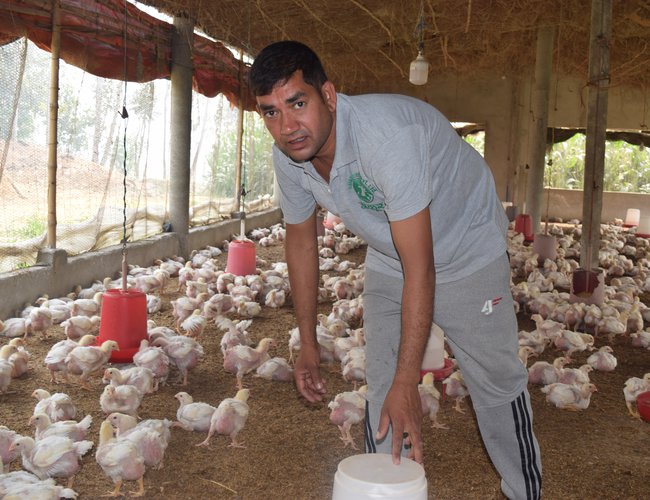
As the RERP- Samriddhi is closing within a month, it will be remembered by many as a life-saver. Among the hundreds of beneficiaries, Birendra Chimauria of Chandrapur Municipality Ward 9 and Maheshwor Acharya and Birendra Chaudhary of Itahari Sub-Metropolitan are notable examples of how the project has transformed lives.
After spending nearly seven years working in Malaysia and Qatar, Chimauria, Acharya, and Chaudhary respectively returned to Nepal three years ago in the midst of the COVID-19 pandemic. Despite their savings and determination to start anew, they lacked the skills needed in the local job market and wandered in search of employment.
Turning Point
Information from their respective ward offices about Vocational Skill Training (VST) for the maintenance of air conditioners and refrigerators proved to be a turning point.
Acharya and Chaudhary applied for the training and were selected due to their status as returnee migrants. This opportunity marked a significant shift in their lives.
Before the training, both Acharya and Chaudhary faced frustrations in their job searches, having remained unskilled laborers despite their long work experience abroad.
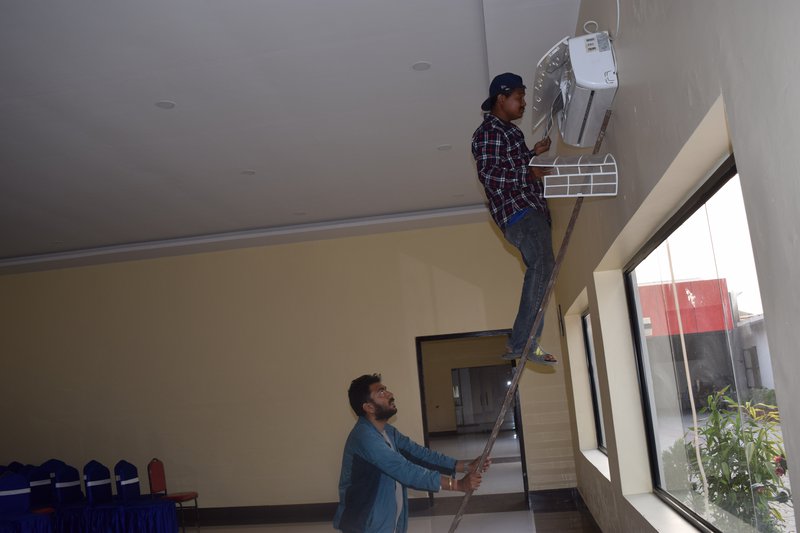
Like many Nepali migrant workers, they left and returned as unskilled laborers. However, after completing the three-month training, they were employed by the training provider in a refrigerator, air conditioner, and TV maintenance shop in Itahari.
Path to Entrepreneurship
The training program required providers to engage the trainees in practical work. After working for over five months and earning a monthly salary of around Rs. 16,000, Acharya and Chaudhary decided to start their own maintenance shop.
Before the training, both Acharya and Chaudhary faced frustrations in their job searches, having remained unskilled laborers despite their long work experience abroad. Like many Nepali migrant workers, they left and returned as unskilled laborers. However, after completing the three-month training, they were employed by the training provider in a refrigerator, air conditioner, and TV maintenance shop in Itahari.
Knowing some clients during their job, Acharya and Chaudhary started receiving calls for maintenance and installation of air conditioners. As the temperature rose, almost all households called on their support to install AC units. “We are so busy that each day we install five to six units, earning Rs. 15,000.00 (USD 110) per day. In the last three months, each of us has earned around Rs. 300,000.00 (USD 2,200),” said Acharya. “Even on normal days, we earn Rs. 3,000.00 (USD 25). This earning is much higher than what we used to make in Qatar,” echoed Chaudhary.
In the newly emerging towns of Koshi Pradesh, such as Itahari, Dubhi, Inaruwa, and Urlabari, AC and refrigerator maintenance is a crucial part of urban life.
Employment is more or less secure for both Acharya and Chaudhary. “We receive two to three calls daily for maintenance of ACs and refrigerators, which is enough to earn a monthly income of around Rs. 40,000.00 (USD 300),” said Acharya, who invested around Rs. 200,000 (USD 1,500) of his savings from Qatar to purchase the necessary equipment.
“We are very grateful to the RERP-Samriddhi Project and Helvetas-Nepal for providing us with skills that have helped us reintegrate into the country with viable employment,” said Acharya and Chaudhary.
Birendra Chimauria's Journey
Birendra Chimauria, a returnee migrant from Malin Tole of Chandrapur Municipality Ward 9 in Madhesh Province, faced a desperate situation after having to cull 2,000 chickens due to bird flu. With the help of his ward office, he enrolled in the Village Animal Health Worker (VAHW) Level 1 training.
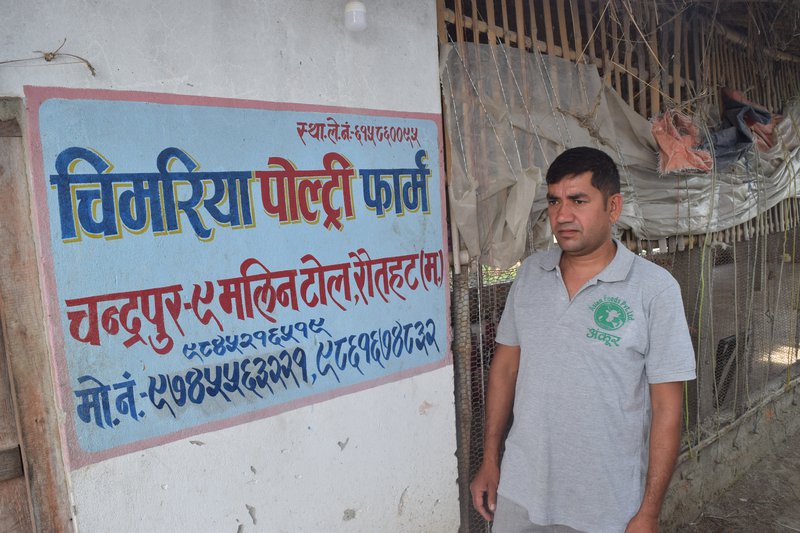
The 390-hour skill training was a game changer in Chimauria’s life. With the training, he learned the complexities and benefits of operating a poultry farm. Before resuming his farm, he visited larger and mid-scale poultry farms in Chitwan and had water samples tested in a lab there.
With newfound skills and knowledge, Birendra Chimauria invested in 2,500 broiler chicks two years ago, leading to great success and recovery from the damage he incurred three years ago.
"There is a great demand for broiler chickens in the area. I don’t have any problems with the market. I realized that starting this type of business on my land in my village would enable me to earn a good income," he said. He sells chicken meat at Rs 350 per kilogram.
Having worked in a grocery store delivering household goods in Malaysia, Chimauria had a basic understanding of marketing but lacked the technical skills required to run a poultry farm.
"I invested Rs 500,000 (USD 3,500) saved from Malaysia in the first year. Unfortunately, the loss in the first year was devastating. With my remaining savings and a loan from a cooperative, I resumed the business, which then produced a bumper yield. Now, in the fourth year of business, I have repaid all my loans and have savings of around Rs 900,000 (USD 6,000)," said Chimauria.
Chimauria realized the importance of skills in starting any venture. "Had I learned the necessary skills before starting the poultry business, I wouldn't have had to go through such a difficult situation," he reflected.
With the 390-hour skill training recognized by CTVT, Chimauria is now a certified veterinary worker with the authority to administer vaccines to chicks and chickens and other primary medicines. He credits the training for his current success and stability in the poultry business.
"By learning these skills, I can take precautionary measures to prevent another bird-flu tragedy like the one four years ago. If I notice any of my chickens or chicks showing abnormal behavior, I immediately isolate them and administer primary medicines," said Chimauria, a father of two sons and a daughter who are pursuing education in a boarding school in Hetauda.
The success stories of Acharya, Chaudhary, and Chimauria highlight the importance of skill training for returnee migrants to successfully reintegrate into both off-farm and on-farm ventures.
Like these three, over 450,000 Nepalese workers migrate to various countries each year. According to data from the Ministry of Labor, Employment, and Social Services (MoLESS), 74.5% of these migrants are unskilled workers, 24% are semi-skilled, and only 1.5% are skilled.
Nepal is currently experiencing a demographic dividend, with 40% of the population under the age of 20 and over 70% in the working-age group. Despite this, over 33% of the workforce is illiterate, and over 50% have only completed secondary education.
To address this issue, the Nepalese government is promoting skill development programs and opening technical schools in all municipalities to increase accessibility. However, many of these schools are not yet operational.
In this challenging context, the skill training provided by Helvetas-Nepal under the RERP-Samriddhi Project has been highly significant. With around 11% of the population unemployed, many youths are forced to migrate abroad. Skill training for returnee migrants and unemployed youth, especially those from economically and educationally disadvantaged backgrounds, is crucial for improving their prospects and reintegrating them into the local economy.
“When things were not going well and state was breaking stage two years ago, I took a big risk to continue work with RERP-Samriddhi as a partner to provide skill training under Decent job. As the project nears its closure, the Decent Job Components have significantly contributed to achieving the project’s targets. Working in close collaboration and partnership with the Ministry of Industry, Commerce and Supply and RERP’s officials and IFAD, Helvetas-Nepal’s team has successfully fulfilled its role as a partner. On behalf of Helvetas-Nepal, I would like to thank the officials from the Ministry, the IFAD team, and the RERP-Samriddhi Project for their support,” said Dr. Prabin Manandhar Country Director of Helvetas-Nepal.
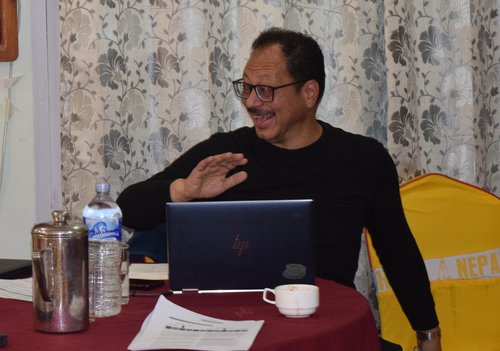
Providing skill training has proven to be a comprehensive measure that helps returnee migrants find viable employment options. Although the RERP covered only a small part of local-level governments in three provinces, replicating the successful strategies learned through the Decent Job will help many unemployed and returnee migrants find employment back home.
“Decent Job is a major component of the project aimed at addressing unemployment and skill gaps. The project promoted decent jobs through TVET programs, job placements, and apprenticeships through Federation of Nepalese Chamber, Commerce and Industry (FNCCI). It followed an outcome-based approach to vocational skills, creating gainful employment and encouraging local-level governments to develop a Technical and Vocational Training (TVET) policy,” Saroj Prasad Guragain, the project manater. “The Nepal government will share these learnings with all three tiers of government.”

The three successful cases of skilled workers who are satisfied with their jobs also tend to be in better physical and mental health. Experience has shown that skilled workers can continue their careers in similar occupations after returning home, reducing the likelihood of repeated migration.
The Sustainable Development Goals (SDG) 2030 recognize skills development and migration as key drivers of sustainable economic development, bringing significant benefits to migrants and their communities through the transfer of skills and financial investments in their countries of origin. The RERP-Samriddhi Project's achievements support Nepal's commitment to achieving these SDGs.
“Under the Decent Job initiative, RERP-Samriddhi has produced 29,321 apprenticeships and VST graduates in 208 local governments across 16 districts and three provinces of Nepal. These programs were conducted in collaboration with 139 local governments in Koshi, Madhesh, and Bagmati Provinces, as well as the FNCCI-Koshi Province,” said Sandip Paudel, Team Leader of Helvetas-Nepal. “A positive sign of sustainability is that 12 municipalities have already developed guidelines, two municipalities have endorsed the policy, and four municipalities have created TVET Strategic Plans. Despite the challenges, we are concluding the project having achieved all our targets.”
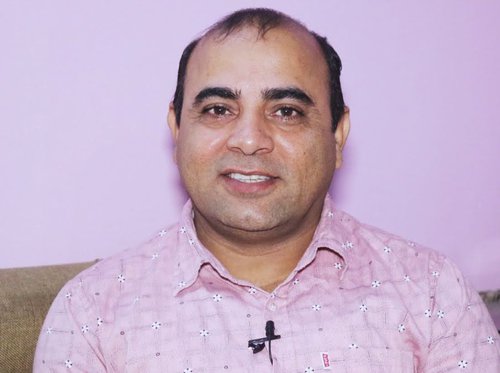
“Our experience shows that developing the skills of migrants does not promote further migration; instead, it protects young people from risking their lives by going abroad without any skills,” Paudel added. “Another important lesson from the project is the need to incorporate business skills alongside vocational training to promote self-enterprise.”
In 2023, Nepal received USD 12 billion in remittances. Compared to other labor-sending countries like the Philippines, India and Sri Lanka, this amount is relatively low, partly because most Nepali workers are unskilled.
According to the World Bank's report "Understanding the Skills Needs of Migrant Workers from Nepal," the average earnings of migrants with training were considerably higher compared to those without training. Most Nepali migrants work in low- and semi-skilled occupations abroad, such as laborers, construction workers, security guards, and drivers, with skills often acquired informally.
Few migrants had undergone any formal skills training prior to their migration episodes. The areas in which training was desired included semi-skilled occupations such as driver, electrician, cook, and computer operator. The most commonly desired durations for training were three months, followed by six months.
“We have achieved significant success through the project interventions across various sectors. Many valuable lessons have been learned in the areas of cooperative capacity building, gender equality, decent jobs, and integrating returnee migrants while working closely with local governments,” said Sanjeev Kumar Shrestha, National Consultant (Value Chain & Markets) at the International Fund for Agricultural Development (IFAD).
Under the Decent Job initiative, the Vocational Skill Training (VST) provided to the agricultural sector supply chain has increased production and productivity. The enhancement of technical skills and knowledge has led to higher incomes for returnee migrant farmers like Chimauria.
The Decent Job component of RERP-Samriddhi has demonstrated the powerful impact of vocational training in transforming the lives of women, youth and returnee migrants from poor and marginalized communities’ returnee migrants.
The project's success stories underscore the importance of skill training in providing sustainable economic opportunities and improving the well-being of returnees in Nepal. The project’s learnings will continue to inform Nepal's efforts to enhance skills development and support sustainable economic growth.

Keshab Poudel
Poudel is the editor of New Spotlight Magazine.
- ERC Nepal Is Focused On Expanding Distribution And Transmission To The Private Sector: ERC Chair Dr. Dhital
- Jul 06, 2025
- FOURTH PROFESSOR Y.N. KHANAL LECTURE: Nepal-China Relations
- Jun 23, 2025
- Colonel JP CROSS: Centenary Birthday
- Jun 23, 2025
- BEEN: Retrofitted For Green
- May 28, 2025
- GGGI has been promoting green growth in Nepal for a decade: Dr. Malle Fofana
- May 21, 2025















